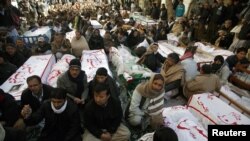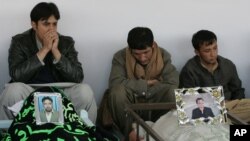ISLAMABAD, PAKISTAN —
Anger and frustration rose in Pakistan Saturday over bomb blasts that killed almost 100 Shi'ite Muslims, with critics saying the government is failing to protect the nation's religious minority.
Shi'ite families in the southwestern city of Quetta on Saturday have refused to bury their dead to protest the bomb blasts that killed almost 100 people Thursday. Sunni militants claimed responsibility for the attack.
One Shi'ite community leader criticized Pakistan's army chief, General Ashfaq Kayani, for failing to halt the killings. Such attacks have been increasing steadily, according to Pakistan Human Rights Watch, which says more than 400 Shi'ites were killed last year.
Call for sympathy protests
Pakistanis anxious to reduce the violence reached out through social media Saturday, calling for sympathy protests in the capital, Islamabad, and other major cities.
Prime Minister Raja Pervez Ashraf said in a statement the government has given the paramilitary Frontier Corps expanded powers to control violence in the province. He also promised financial compensation would go to affected families.
Analyst Raza Rumi said it remains to be seen if public pressure rises to a point that forces political leaders and the military to act against terrorist and militant organizations operating in Pakistan.
"There is no shortcut in Pakistan now for the military to act other than public pressure - intense public pressure, scrutiny and naming and shaming - because, you know, it is quite clear the military is not keen to do anything, or even the government, about these terrorist organizations," said Rumi.
Multiple explosions
The same day the explosions in Quetta targeted Shi'ites living there, another blast by the Baluch nationalist network killed 12 people, mostly security personnel. A fourth explosion in northwest Pakistan killed more than 20 Muslim missionaries.
The violence and subsequent criticism of the government and security forces comes as Pakistan is gearing up for national elections expected in a few months.
Mustafa Qadri of Amnesty International says putting an end to terrorist violence is a challenge with which any new government will have to grapple.
"Now it's up to the political parties to provide really concrete steps and plans for what they will do differently when in government," said Qadri. "And of course for the government right now, we still have several months before the elections, but the new government really now has this pressure on its shoulders to really do things differently and to do the reforms that are needed to stop this stuff from happening again."
Qadri said that in the past, when the state has had the will to bring perpetrators to justice and to protect victims, Pakistan has shown the capacity to do so.
Shi'ite families in the southwestern city of Quetta on Saturday have refused to bury their dead to protest the bomb blasts that killed almost 100 people Thursday. Sunni militants claimed responsibility for the attack.
One Shi'ite community leader criticized Pakistan's army chief, General Ashfaq Kayani, for failing to halt the killings. Such attacks have been increasing steadily, according to Pakistan Human Rights Watch, which says more than 400 Shi'ites were killed last year.
Call for sympathy protests
Pakistanis anxious to reduce the violence reached out through social media Saturday, calling for sympathy protests in the capital, Islamabad, and other major cities.
Prime Minister Raja Pervez Ashraf said in a statement the government has given the paramilitary Frontier Corps expanded powers to control violence in the province. He also promised financial compensation would go to affected families.
Analyst Raza Rumi said it remains to be seen if public pressure rises to a point that forces political leaders and the military to act against terrorist and militant organizations operating in Pakistan.
"There is no shortcut in Pakistan now for the military to act other than public pressure - intense public pressure, scrutiny and naming and shaming - because, you know, it is quite clear the military is not keen to do anything, or even the government, about these terrorist organizations," said Rumi.
Multiple explosions
The same day the explosions in Quetta targeted Shi'ites living there, another blast by the Baluch nationalist network killed 12 people, mostly security personnel. A fourth explosion in northwest Pakistan killed more than 20 Muslim missionaries.
The violence and subsequent criticism of the government and security forces comes as Pakistan is gearing up for national elections expected in a few months.
Mustafa Qadri of Amnesty International says putting an end to terrorist violence is a challenge with which any new government will have to grapple.
"Now it's up to the political parties to provide really concrete steps and plans for what they will do differently when in government," said Qadri. "And of course for the government right now, we still have several months before the elections, but the new government really now has this pressure on its shoulders to really do things differently and to do the reforms that are needed to stop this stuff from happening again."
Qadri said that in the past, when the state has had the will to bring perpetrators to justice and to protect victims, Pakistan has shown the capacity to do so.







